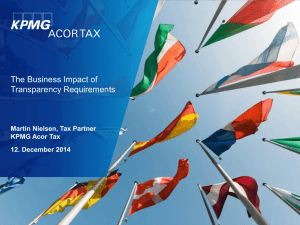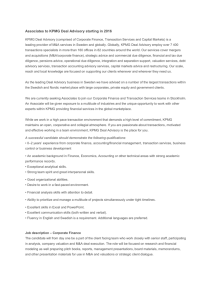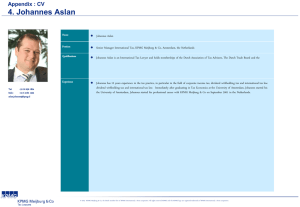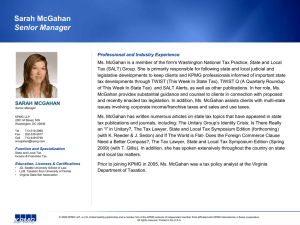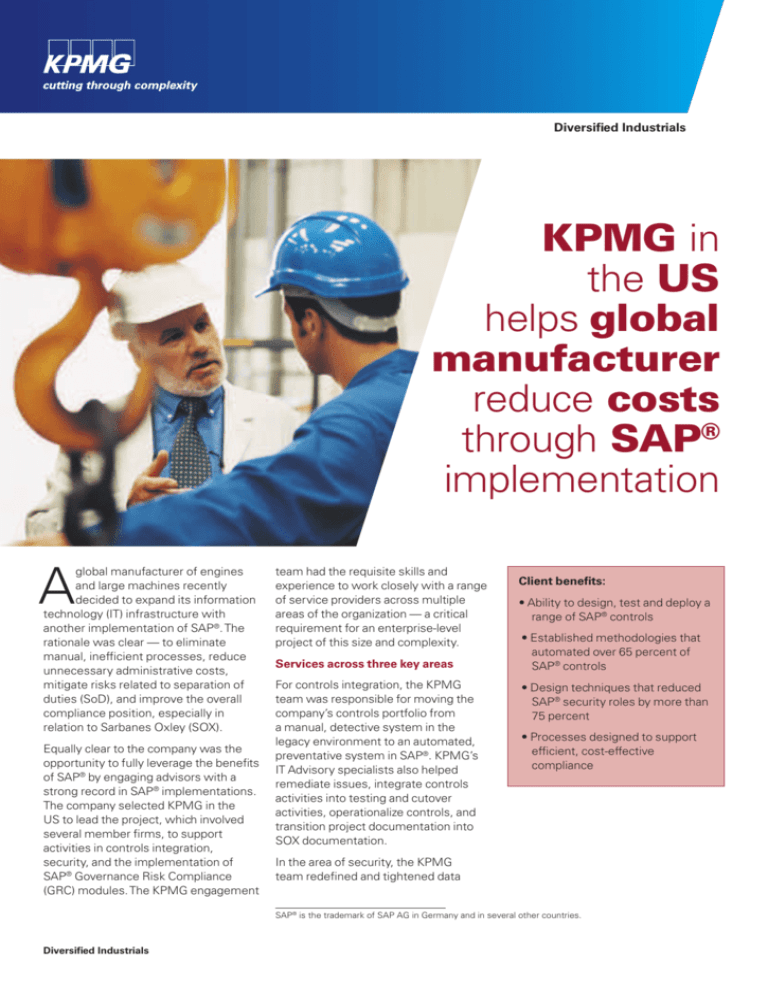
Diversified Industrials
KPMG in
the US
helps global
manufacturer
reduce costs
through SAP®
implementation
A
global manufacturer of engines
and large machines recently
decided to expand its information
technology (IT) infrastructure with
another implementation of SAP®. The
rationale was clear — to eliminate
manual, inefficient processes, reduce
unnecessary administrative costs,
mitigate risks related to separation of
duties (SoD), and improve the overall
compliance position, especially in
relation to Sarbanes Oxley (SOX).
Equally clear to the company was the
opportunity to fully leverage the benefits
of SAP® by engaging advisors with a
strong record in SAP® implementations.
The company selected KPMG in the
US to lead the project, which involved
several member firms, to support
activities in controls integration,
security, and the implementation of
SAP® Governance Risk Compliance
(GRC) modules. The KPMG engagement
team had the requisite skills and
experience to work closely with a range
of service providers across multiple
areas of the organization — a critical
requirement for an enterprise-level
project of this size and complexity.
Services across three key areas
For controls integration, the KPMG
team was responsible for moving the
company’s controls portfolio from
a manual, detective system in the
legacy environment to an automated,
preventative system in SAP®. KPMG’s
IT Advisory specialists also helped
remediate issues, integrate controls
activities into testing and cutover
activities, operationalize controls, and
transition project documentation into
SOX documentation.
Client benefits:
• Ability to design, test and deploy a
range of SAP® controls
• Established methodologies that
automated over 65 percent of
SAP® controls
• Design techniques that reduced
SAP® security roles by more than
75 percent
• Processes designed to support
efficient, cost-effective
compliance
In the area of security, the KPMG
team redefined and tightened data
SAP® is the trademark of SAP AG in Germany and in several other countries.
Diversified Industrials
The
KPMG team
of specialists was able to work
closely with a variety of service
providers
to help support the costreduction goals of
the client.
Neil O’Donovan
Managing Director,
KPMG in the US
access based on SoD. The existing
SAP® security role strategy was overly
complex and granted excessive levels
of access to SAP® users. The KPMG
team designed and executed an easyto-maintain and scalable strategy that
limited excessive access by adhering to
a least-privilege principle.
GRC activities supported by KPMG
involved mitigating risk related to user
access during the SAP® implementation.
KPMG specialists designed and
implemented a SAP® GRC tool suite that
helped automate SoD analysis for SAP®
roles and user assignments in addition
to automating user provisioning and role
approval processes. The KPMG team
also implemented a password reset
self-service solution using SAP®
GRC tools.
Improved risk management
processes and cost savings
The SAP® implementation was
shown to mitigate risk and enhance
the company’s compliance efforts.
The central benefit, however, was a
significant reduction in costs for security
administration. This was driven by the
automation of over 65 percent of SAP®
controls and the reduction of SAP®
security roles by more than 75 percent.
These cost reductions are expected
to continue, based on implementation
of automated workflows, streamlined
procedures, improved compliance
reporting and efficient self-service
solutions, with the assistance of the
KPMG team.
Contact us
Jeff Dobbs
Global Head of Diversified
Industrials
KPMG in the US
T: +1 313 230 3460
E: jdobbs@kpmg.com
Graham Smith
Global Head of Engineering and
Industrial Products
KPMG in the UK
T: +44 20 7311 4731
E: graham.smith@kpmg.co.uk
kpmg.com
The information contained herein is of a general nature and is not intended to address the circumstances of any particular individual or entity. Although we endeavor to provide accurate and timely
information, there can be no guarantee that such information is accurate as of the date it is received or that it will continue to be accurate in the future. No one should act on such information without
appropriate professional advice after a thorough examination of the particular situation.
© 2011 KPMG International Cooperative (“KPMG International”), a Swiss entity. Member firms of the KPMG network of independent firms are affiliated with KPMG International. KPMG International
provides no client services. No member firm has any authority to obligate or bind KPMG International or any other member firm vis-à-vis third parties, nor does KPMG International have any such
authority to obligate or bind any member firm. All rights reserved.
The KPMG name, logo and “cutting through complexity” are registered trademarks or trademarks of KPMG International.
Designed by Evalueserve. Publication name: DI Case Studies. Publication number: 111109D. Publication date: November 2011



